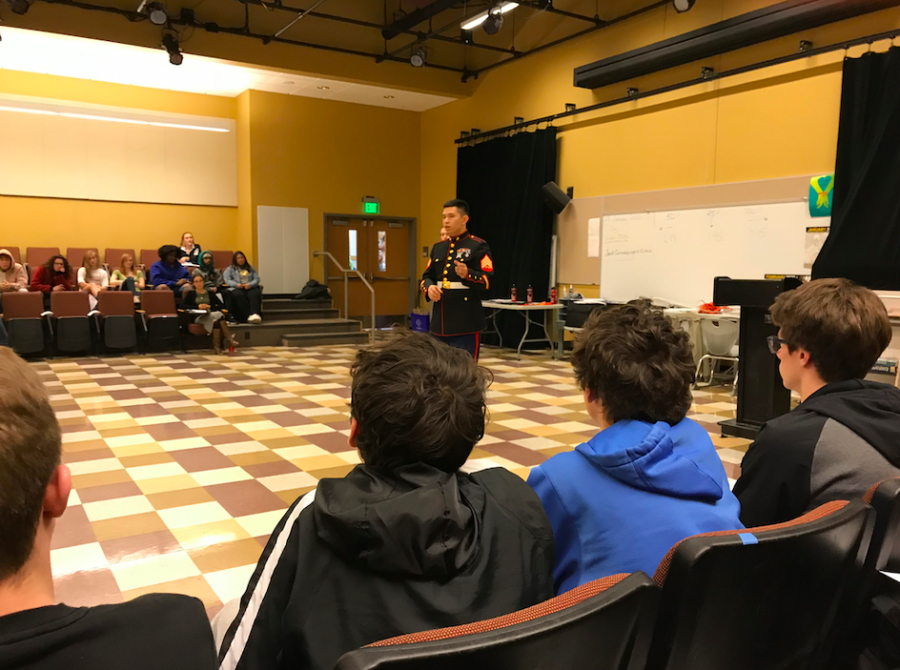WW’ 20: The reality behind the Marines experience
Credit: Max Brande
During Winter Week 2020, Sergeant Christian Aube and Staff Sergeant Miller came to WHS to talk to students about their time in the Marines. “Steel sharpens steel, so you got to learn from your peers,” Aube said. “You’ve got to be able to rely on your peers, and they rely on you. That way you have that strong bond, that camaraderie, the pride of being in that group, no matter what happens.”
February 2, 2020
When most people think of the Marines, they think of the military as a whole. The name is commonly associated with the image of elite soldiers in camouflage fatigues. For many, the thought of joining the military evokes thoughts of combat and of fighting to defend the nation.
Protecting U.S. interests through military force, however, is not the only way the Marines serve the country. For Marine Sergeant Christian Aube and Staff Sergeant Miller, a career in the Marines has not involved combat abroad. Rather, both men have found ways to serve their country through technical support for the Marine Corps.
“[In the Marines], 86% of our jobs are support jobs,” Aube said.
Sargeants Aube and Miller gave a presentation to WHS students on Tuesday about their military involvement and how it has impacted their careers and lives. In their discussion, they talked about their respective roles in the Marines and how they got involved with the military.
“I joined the military when I was 21 years old,” Aube said. “[Before that], I was working full time at TD Bank and Home Depot at the same time. I grew up in an army family, and they always told me to join the army. I wanted a real challenge going there, so I said I’m going to join the Marine Corps. I am the first marine in my family.”
Both Aube and Miller, who have been serving in the Marines for eight and nine years respectively, work in support roles involving technology. Aube is an air traffic control systems technician, and Miller works on the inspection of F-18 engines.
“I am an aviation communication systems technician,” Aube said. “I work on a communication system that houses radios in computers, and I make sure that people [in the air] can communicate with the guys on the ground. I’m their middleman.”
In their respective roles, both Aube and Miller found that their careers in the Marines have not reduced their value of education but rather placed a greater emphasis on their value. Aside from the heavy involvement of technical support in the Marines’ operations, programs like the Naval Reserve Officers Training Corps, also known as NROTC, further encourage military members to pursue and reap the benefits of higher education.
In their presentation, Aube and Miller emphasized the advantages offered by the NROTC in particular, which affords selected military members the opportunity to attend eligible colleges with a full scholarship.
“The NROTC program is a very competitive program,” Aube said. “It’s not for everyone. They look at people and they want to make sure the person they’re giving this full ride to is [qualified].”
One important point that Aube and Miller highlighted was the notion of constant improvement, a principle that is a fundamental part of the Marine Corps experience. This improvement comes from a variety of sources, be it from fellow marines, the Marine Corps administration or just the culture in the organization.
“[In the Marines], you’re always learning new ways to improve yourself. You’re always sharpening your axe and being the best you can,” Aube said. “The Marine Corps takes that very seriously. They’re always trying to send you to college, get you in the best physique you can have. They’re trying to make sure when you get out of the Marine Corps, whether it’s after four years or 40 years, that you’re better than when you came in, mentally, physically [and] spiritually.”





![Last Wednesday, the Wayland School Committee gathered to discuss a number of topics regarding the health curriculum and Innovation Career Pathway course. Another large topic of conversation was the ways to potentially mitigate distracting cell phone usage. "These [phones] are going to distract your learning and social relationships," Superintendent David Fleishman said. "That's concrete right there."](https://waylandstudentpress.com/wp-content/uploads/2025/06/Screenshot-2025-06-04-at-9.49.31 PM-1200x886.png)



























![Troy Hoyt finishes the Boston Marathon, running for the Hoyt Foundation. T. Hoyt is the son of Hoyt Foundation CEO Russ Hoyt.
“[Running a marathon] might seem like a big thing, when it’s presented to you at first, but if you break it up and just keep telling yourself, “Yes, you can,” you can start chipping away at it. And before you know it, you’ll be running the whole 26 miles, and you won’t even think twice about it.” T. Hoyt said.](https://waylandstudentpress.com/wp-content/uploads/2025/04/C36E8761-1CBB-452E-9DF2-543EF7B1095E_1_105_c.jpeg)














































